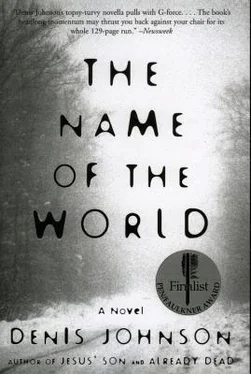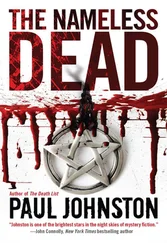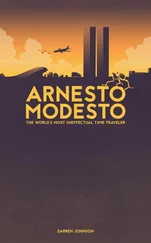How many interviews, how many J.J.s winding what quantity of pasta around how many forks, did the future hide? The question dropped me in a pit. Is there any limit, I thought, to how boring this place can be? By the time we’d both turned down dessert and were halfway through our cups of coffee, I’d decided no. No limit. “Do you know what?” I said. “I think I’ll let this next year be my last. I believe I’m through with the life of the mind.” Getting it said felt like a minor thing, but necessary. Like finally taking a second to tie a flapping shoelace.
“Through with the life of the mind! Now I’m convinced you’re just the guy we need at the Forum.”
“No. Thanks, but no.”
A bit of silence between us now. We heard a man and a woman talking at the table just next to ours. The woman mentioned somebody’s funeral. J.J. took an interest.
He stopped eating. He was clearly eavesdropping. Now the woman said, “I think it’s muggy in Alabama. Isn’t it?”
“Muggy?” the man said. “It’s Alabama.”
“I’m sorry,” J.J. said, “excuse me—”
They both looked over at us. J.J. said to them, “Trevor Watt is dead?”
They looked at each other for a second, and then back at J.J. “Yes — he’s dead.” It came out of both their mouths at once.
The man said, “He had a heart attack last Saturday.” J.J. cleared his throat. He looked stunned. “I’m sorry,” he said again. “He was a pretty good acquaintance of mine. Where was he?”
“He was at Brown,” the woman said.
The man said, “Well, but he’d retired. He was living in—”
“Down in Alabama someplace,” the woman said.
While we paid our bill, J.J. went on chatting with them, and I urged him to take his time. I stepped outside and stood smoking a cigar on the sidewalk. Casually I drop that fact, but actually I’ve never smoked. This one had been given to me. People gave me gifts, people liked me, maybe because they sensed I was virtually dead and couldn’t hurt them.
I’d been waiting for J.J to take up the subject of his wife, to open a window on his bitterness this day of his divorce. But nothing of the kind had happened. He and his wife had been separated a couple of years. Crossing the legal finish line seemed to have made him pensive today, but I supposed in general he’d mended.
As a matter of fact, just a few weeks previous I’d met J.J.’s wife. This was at a large dinner party at a Dean’s house, one of those old-fashioned affairs where many had come for dinner but most — the students — would be booted out after cocktails. She’d been traveling through with T. K. Nickerson, the writer who’d won her away from us. Everybody called him “Kit.” Her name was Kelly. Kit and Kelly had been on their way to, or from, Europe in the dead of winter. Kelly was a beautiful woman, striking without having to be glamorous. She just dropped a purple silk dress over her head and she was ready to spend an evening in a room full of men trying not to go crazy in her presence. Tiberius Soames, my Haitian colleague in the Department of History, attached himself to her early that evening and never left her side. Her eyes looked sleepy, but her gaze was vibrant. She had very pale eyelashes. Straight strawberry hair to her shoulders.
Another redhead was also there at the dinner party that night, the redheaded cellist, the creator of the Cannon Performance, that is. She was working for the caterer of this affair, helping in the kitchen and bringing around the food. She wore a gray-and-white uniform and had her hair bunched under a black net, and she looked very plain. But that only accentuated the aura of her mischief. She moved among us with a tray like the secret queen of some criminal enclave, casing the joint. As I reached for one of her hors d’oeuvres, she smiled and said, “Hello, Michael Reed.”
It had been a month or so since we’d met at Ted MacKey’s, and then only briefly. Tonight I’d noticed her right away, but I hadn’t expected to be remembered. I was astonished. I probably looked it. She smiled and passed by.
Before we all sat down to eat, I made sure to find out her name. This was a nerve-racking endeavor, not entirely to my surprise. Less than two weeks earlier, I’d been staring at her naked privates. I tried to intersect her path as if by accident. I sidled around and we approached each other at a drift, like objects in outer space. “You’re overly fond of these little numbers,” she said of the items on her tray.
“No. I was trying to remember your name. I’m sorry. I can’t remember.”
“Flower.” After a small challenging beat of silence during which I managed not to ask if she was kidding, she said, “Yes. Flower Cannon.”
“Oh! — Cannon.”
“Oh?”
“I must not have heard it, back when we met.”
“You’d have remembered.”
“Yes.”
“But you saw one of my performances last month, I think.”
“Well,” I said.
“Did you like it?”
“Well…” But I was stalled. I’d become completely stupid. “That is the full text of my remarks,” I said.
Flower Cannon laughed at me and moved along.
As for Kelly Stein, J.J.’s wife, I didn’t pass one word with her beyond a glancing introduction, because during dinner she sat way down the long board, in another conversational district.
I sat almost directly facing Kit Nickerson, however: a much less formidable figure than the black-and-white portraits on his book flaps, a tall and thin man with a boxer’s mashed nose, a prominent Adam’s apple, and kind, watery eyes. He had a bit of a stutter. But it went away as he began arguing with a young author who sat across the table and a couple of places down, so that their exchange roped in a small audience of several others of us. It was hard not to feel slightly embarrassed for the other fellow, a guest teacher in the English Department here, as Kit himself had been two years before, when he’d hooked up with Kelly Stein — a prodigy of sorts, this much younger man, still in his twenties, half lost in his baggy clothing, with shoulder-length hair and a sweet face that cleared him of any suspicion, at least it seemed to me, that he liked to pick fights. “Do you want me to lie?” Kit asked him. “Because I could certainly manage it. Lying is sort of my vocation.” That was the first audible remark.
Apparently the younger man had accused the famous novelist of betraying his early promise. How he’d reached such a point in the middle of a lot of small talk would have been hard to trace, but having found himself out here past the glow of the party’s lights, so to speak, out in the dark with the great man, he wasn’t backing down, give him that much. I saw his fingers trembling as he touched his water glass. He succeeded in keeping his gaze direct. “The people in your early books were all different from each other. You really sampled the world. I mean, those characters, like in Quest for Tears, or any of the early ones, really…they have some commonalities, they’re people who all have at least some education, and real passion, but outside of that, they can belong to any class, any walk of life. I mean, you got around, put it that way. Now it’s just people covered in jewels, people on yachts, people at state dinners…I’m sorry, I mean I say this as an admirer, a follower, an emulator even — but don’t you think you’re turning into sort of a lapdog for the privileged?”
“But Seth,” Kit said, “you’re just being a snob in reverse. Don’t privileged people have feelings, too? Don’t they have inner lives? Can’t their passion be real?”
“There’s more to it than their material circumstances. Nowadays — in your books nowadays — somehow they’re kind of morally — uh.” He was wilting. “Morally aloof.”
Читать дальше











